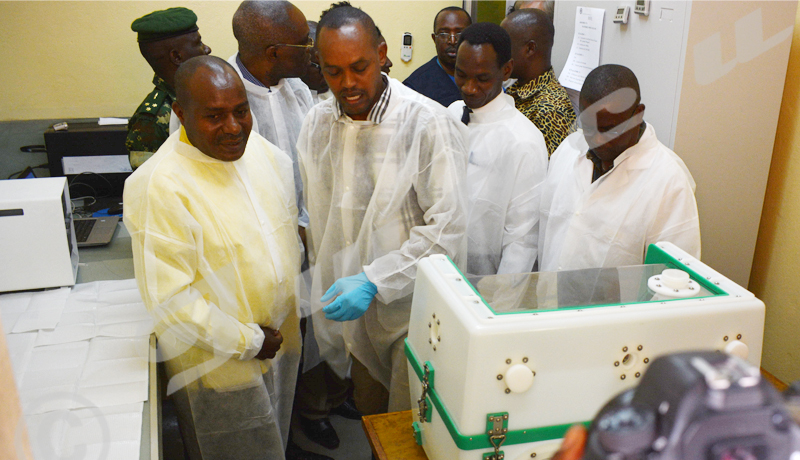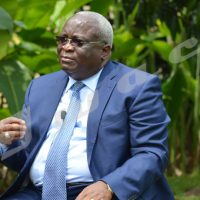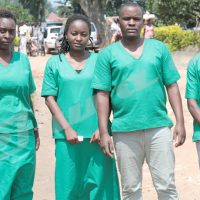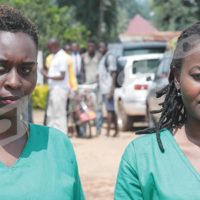The Second Vice-President of the Republic, Dr. Joseph Butore conducted this Tuesday, August 20, 2019 a field visit to inquire about the progress of the preparedness of Burundi to respond to Ebola Virus Disease. Dr. Joseph Butore said he was satisfied with the step already taken and wished more commitment to prevent a possible case of Ebola Virus Disease from reaching Burundi.

-Joseph Butore, Second Vice-President and Dr. Kazadi Mulombo, WHO
Representative, visiting the facilities of the future Ebola Treatment Center in
Mudubugu
Accompanied by the senior staff of the Ministry of Public Health and Fight against AIDS, the Second Vice-President carried out a visit to be updated on the progress made in the framework of the ongoing contingency plan in order to warn people living on the Burundian territory against a possible case of Ebola Virus Disease (EVD).
Delegates from Burundi’s technical and financial partners including Garry Conille, Resident Coordinator of the United Nations System in Burundi and Dr. Walter Kazadi Mulombo, WHO Representative also took part in the visit.
The program began with the visit to Gatumba port of entry on the border with the DRC to see how passenger control activities are going. There, the Second Vice President was briefed on the measures put in place to control 5,000 travelers who cross this border on a daily basis. Dr. Joseph Butore congratulated the on-site team “Be courageous! You’re doing a commendable job,” he said.
Thanks to the support from WHO and partners, the site is equipped with a thermal camera that automatically monitors and records travelers’ temperature data, in addition to a hand-washing device. The control device operates with electricity but also has a backup power system using solar energy.
A guided visit to infrastructures and response devices
The Second Vice President continued his visit to the National Institute of Public Health (INSP). This institute has a national reference laboratory. With the support of WHO, the capacity of this laboratory has been strengthened in terms of equipment and staff kills. The laboratory worker said that the institute is now well equipped. “The laboratory is now able to receive, analyze samples and diagnose Ebola Virus Disease.”
After a brief visit to Melchior Ndadaye International Airport where he visited the passenger screening system as well as the isolation space set up in the airport compound, the Second Vice-President continued his visit to Mudubugu site in Bubanza Health District, which will house the Ebola Treatment Center. The same locality is home to a health center where the Expanded Program for Immunization teams of the Ministry of Public Health were holding a session on immunization against EVD for the front-line staff.
The immunization session was organized as part of the EVD vaccination campaign launched on August 13, targeting more than 4,300 front-line staff in the 21 priority health districts.
Dr. Butore finally concluded his visit to the site of the future Ebola treatment center (CTE) in Mudubugu which will be handed over to the Government of Burundi very soon.
Throughout his visit to the different center’s premises, WHO specialists explained the functioning of the various units of the Ebola Treatment Centers, including the water circuit management system which was laid out in strict respect of the environment and in order to protect the neighboring populations of the center.
At the end of his visit, the Second Vice-President accompanied by Dr. Kazadi Mulombo, WHO Representative, held a press briefing where he expressed his satisfaction over the progress of the preparedness process of Burundi to respond to a possible case of Ebola Virus Disease.
Dr. Joseph Butore has appreciated the efforts of the Ministry of Public Health and WHO. He also reaffirmed his commitment to work closely with partners. He promised to support the Ministry of Public Health in its efforts to prevent Burundi from ever experiencing a single case of Ebola.
He nevertheless appealed to travelers entering Burundi to use recognized ports of entry which have control teams not only to protect themselves, but also to protect theirs: “Our compatriots and foreigners who visit us should use exclusively the legally recognized borders and the places where the Ministry’s technical staff and our partners are located. As one can carry the Ebola virus without knowing it, when they travel through a clandestine border, they expose themselves and put other people’s lives in danger. But if they go through legal ways, they protect themselves and help us to protect others.”


















 IWACU Open Data
IWACU Open Data

